UK SEO agencies have a gender problem, but it may not be the problem you think. The problem isn’t that there aren’t enough people who identify as women working in SEO agencies. We analysed over 2,000 employees from over 100 UK-based SEO agencies and found women comprise 51% of the UK SEO agency workforce. More women are working in the field than men, even though SEO has traditionally been viewed as male-dominated.
The problem lies here: If women make up the majority of digital marketing agency employees, why do men hold a majority on SEO representation? This is reflected in the speaker lineups of far too many SEO conferences. This is reflected in expert panel webinars. This is reflected in authors’ names in SEO publications. This is reflected within SEO agencies. This is reflected in SEO award dinners. We could go on.
So, where are the women in SEO? Women shout, “We’re right here! Hire us! Promote us! Let us write columns! Let us speak!” But meaningful change is slow to come. So, we amplify one another – swapping opportunities in Slack groups, Whatsapp group chats, Twitter groups, and post-conferences over wine. We make our own opportunities; our own events. Meanwhile, we’re told that it’s all in our heads. There’s no problem here; just LOOK AT ALL THE WOMEN!
Well, we looked at all the women. And the men. We looked at thousands of us to find answers to questions like these:
Is it true that there are more men than women in SEO agencies? (No.)
Is it true that men are likelier to be in a “director” or a “head of” role? (Yes.)
Is it true that men mostly dominate C-suite roles? (Hell, yes.)
We counted and counted and counted some more to get these answers in black and white.
Methodology overview: In Q1 of 2024, we scraped the “meet the team” pages of 102 UK-based digital marketing agencies to find the agency name, employee name, and job title of over 2,000 people. Based on name, photos, and indicated pronouns on social media, we assigned a gender to each employee.
The Gender Gap in UK SEO Agencies Findings
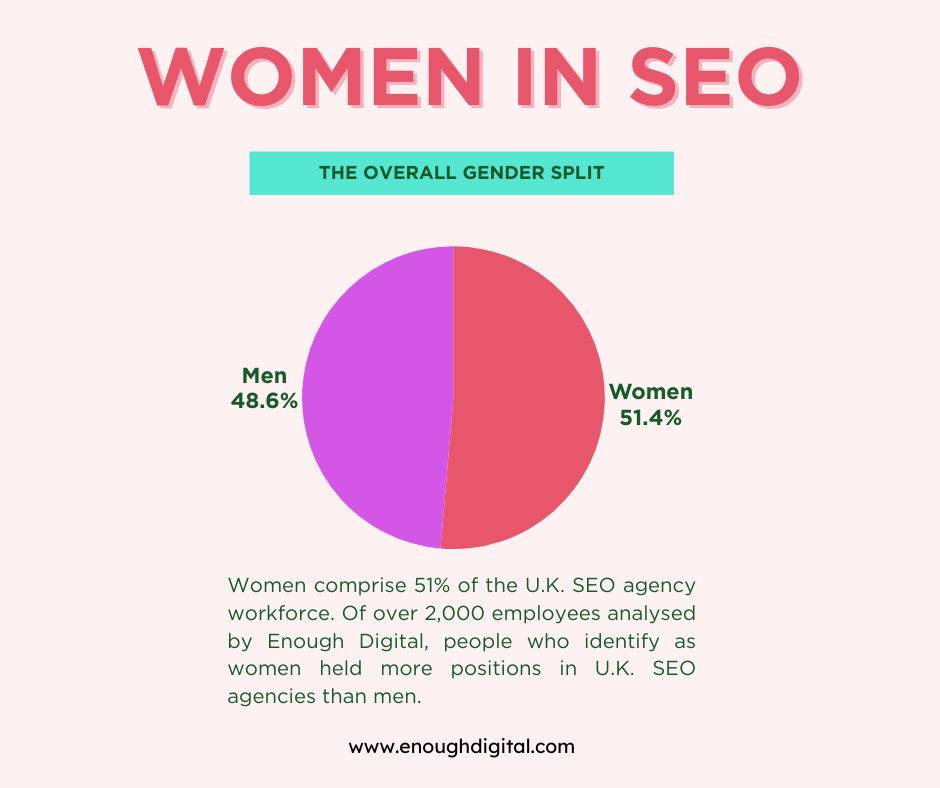


According to our research, women comprise 51% of the UK SEO agency employees listed on agency websites. Our examination of agency “meet the team” pages shows an equal gender mix being publicly presented online. In the UK, women make up 50.57% of the population and men 49.53%, so these figures align with the population mix of the UK.
Women make up more than half of everyone in the UK and should be equally represented. This is important for many (hopefully obvious) reasons, but there are other benefits. Several studies have shown that gender-balanced companies outperform ones that are not balanced. Equality in gender representation is also crucial in attracting more women to a company. A study from Harvard Business Review found that 61 percent of women specifically evaluate the gender diversity of a prospective company’s leadership when deciding whether or not to accept a job offer. A team page that doesn’t reflect gender equality won’t attract women.
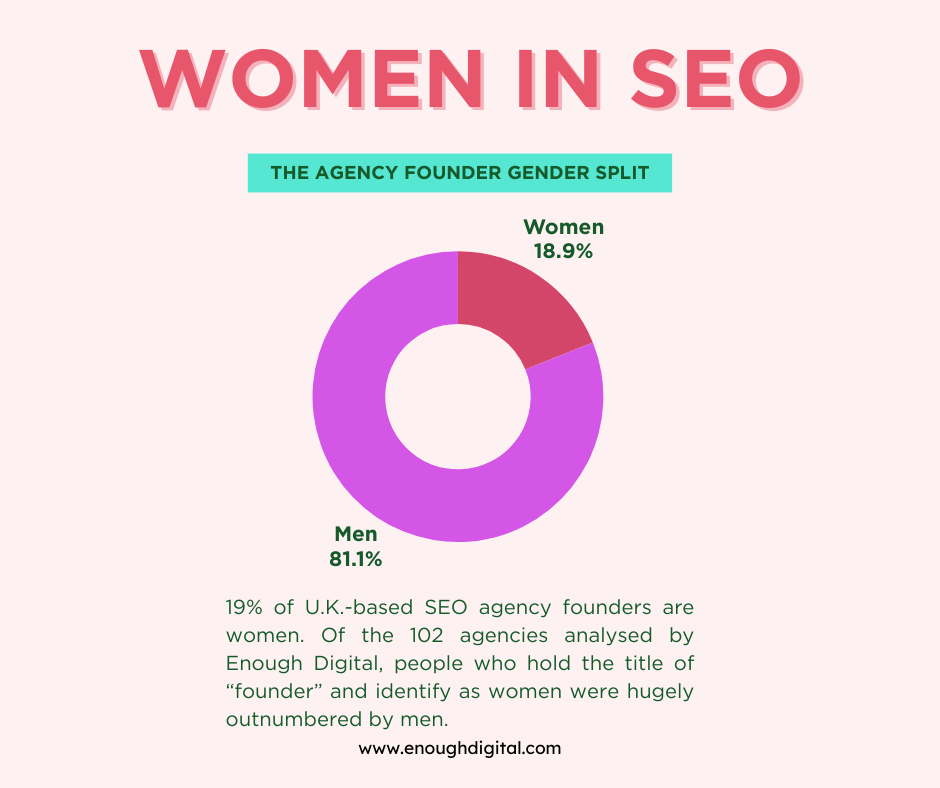


19% of UK-based SEO agency founders are women. Of the 102 agencies we analysed, people who hold the title of “founder” and identify as women were hugely outnumbered by men.
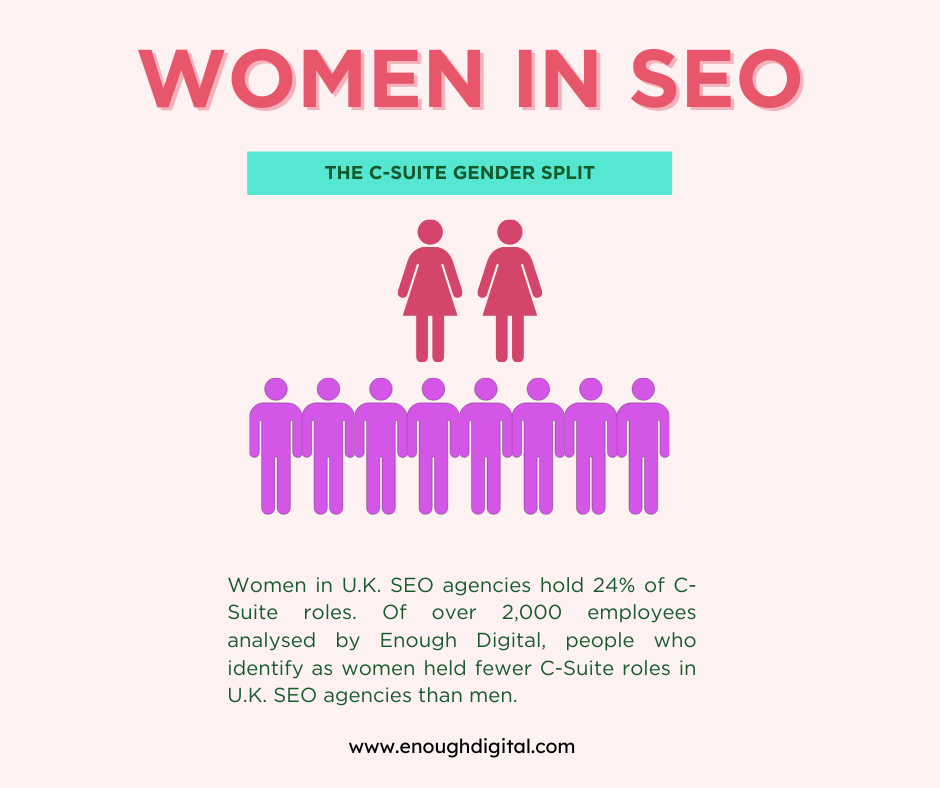


Our research shows women in UK SEO agencies hold 24% of C-Suite roles. Of over 2,000 employees analysed, people who identify as women held far fewer C-Suite roles in UK SEO agencies than men. Job titles such as CEO, CFO, CMO, CTO, CDO, Chairman, and Board member were counted in the C-Suite calculations.
While the gender balance in agencies overall shows as equal at first glance, the gender disparity is evident in both founder and leadership roles in SEO agencies. The lack of women in founder and C-Suite positions is hugely disappointing but not surprising.
Not only is it bad for women, but it’s also bad for companies. A McKinsey study (2019) showed that “companies in the top quartile for gender diversity on executive teams were 25 percent more likely to have above-average profitability than companies in the fourth quartile.” The study also showed that “companies with more than 30 percent women executives were more likely to outperform companies where this percentage ranged from 10 to 30, and in turn, these companies were more likely to outperform those with even fewer women executives, or none at all.”
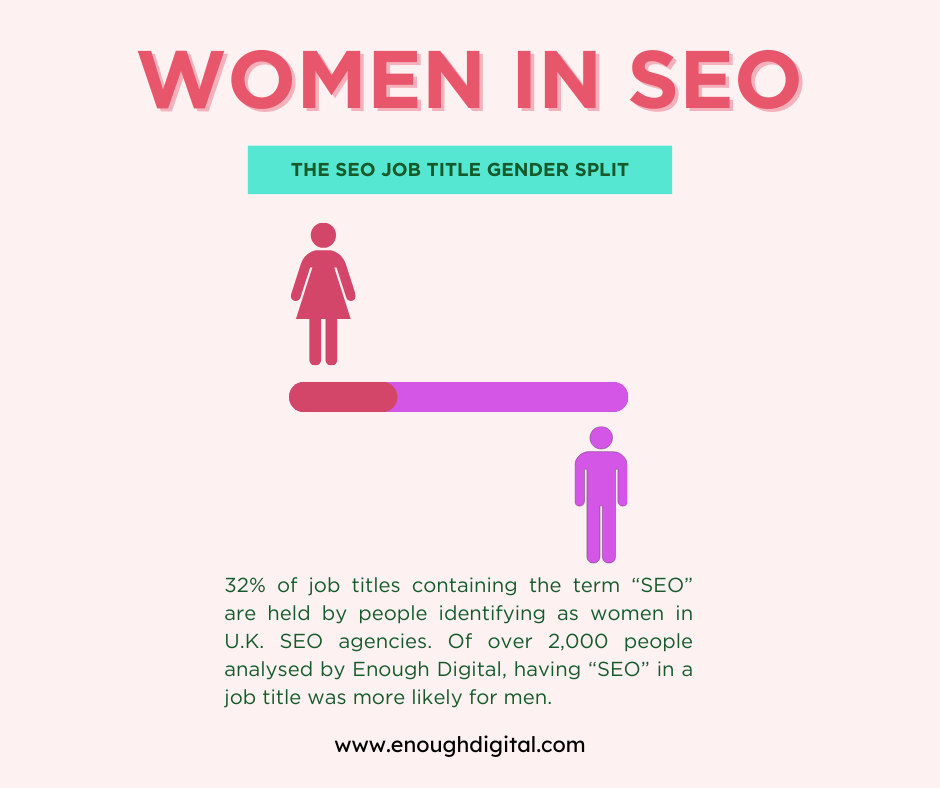


According to our research, 32% of job titles containing the term “SEO” are held by people who identify as women at UK SEO agencies. Of over 2,000 employees we analysed, having “SEO” in a job title was far more likely for men. We recognise that this doesn’t exactly reflect the number of women and men who hold SEO positions; however, we found the gender split between men and women with this job title to be remarkable.
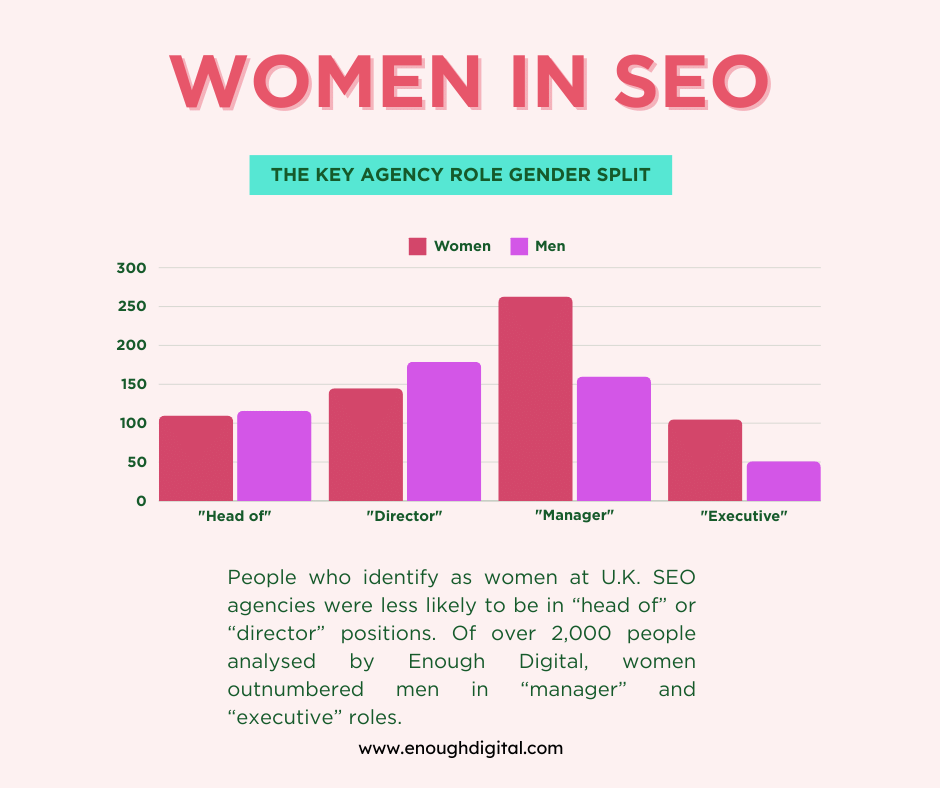


Women SEO agency employees were less likely to be in “head of” or “director” positions than men. Of over 2,000 people we analysed, men held slightly more “head of” positions (without even factoring in that there are more women than men overall) and notably more “director” positions than women. Women outnumbered men in “manager” job titles, which we hope is a sign that agencies are working hard to promote more women further up the leadership ladder. We fear this data could signal a “broken rung” for women stuck in manager roles and not progressing further into leadership positions; however, we don’t have the data to show that this is or is not the case.
Women hugely outnumber men in “executive” roles at UK SEO agencies, which we hope is a sign of a concerted effort to attract more women to the SEO industry and not a way to pad agency gender counts.
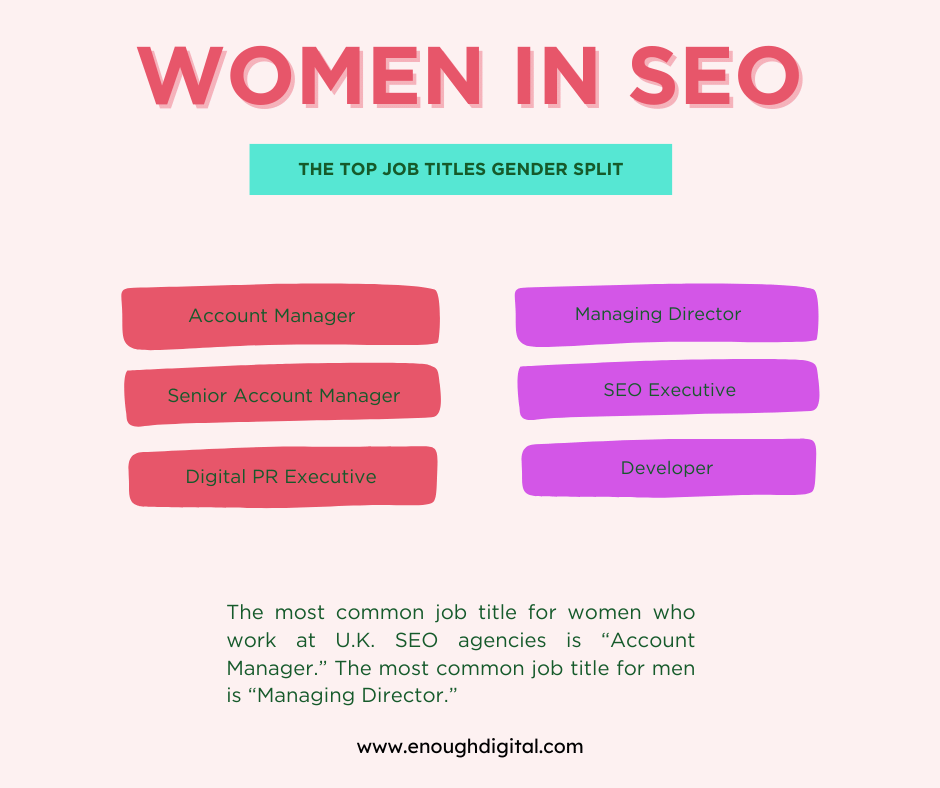


The most common job title for women at UK SEO agencies is Account Manager.
The most common job title for men is Managing Director.
Yes, we double-checked.
Conclusion
UK SEO agencies have a gender representation problem, most notably regarding women’s roles in the C-Suite and as agency founders. Although women outnumber men on agency web pages’ team pages, women are less likely to have equal representation in many key agency roles.
It’s time for a change. We want the SEO industry to take meaningful action by examining its internal hiring and promotion processes and including women in those decisions to create a more equal workplace. Hiring women as executives, Digital PRs, or project managers isn’t enough.
That said, we have realistic expectations for change. Sadly, those realistic expectations are quite low. One of the reasons for studying this data and writing this report was to get a clear look at the industry’s makeup. Many false assumptions exist about our industry and the women who choose to work within it. We hope that when you see those claims being made (I’m looking at you, Twitter), you use our data to refute them.
We thank all agencies with team pages for highlighting the brilliant women and men working hard in our industry daily. Although there is a gender representation problem in SEO, this was only able to be proven by the agencies that feature these pages. Many agencies do not. Some had a robust team page in 2021 and now feature a 404 error in its place. To those agencies, we ask that you be transparent about the people that work for you. Without visibility, there can be no progress.
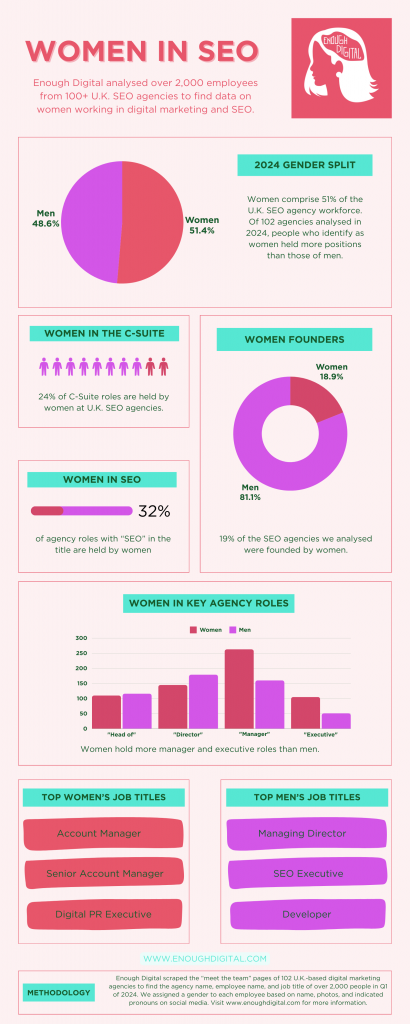


Methodology
This report is entirely based on data from 102 UK-based digital marketing agencies’ “Meet the Team” (or similarly named) pages in early 2024. We used the Instant Data Scraper Chrome extension to extract much of the data, and when that proved impossible (thank you, infinite scroll pages that load randomly each time), we did it by hand. Each person’s gender identity was noted individually by a human and often cross-referenced with the person’s social media accounts to determine gender identity via preferred pronouns. We cleaned the data and used filters in Google Sheets to find notable data sets to write this report.
Background
This report has been years in the making. We started this project in October 2021 by Googling “SEO agency UK” and “Digital PR agency UK” and entering the first five pages of agency names from the SERPs into a spreadsheet. Seven months later, we fully scraped all the team pages for names and job titles in May and August 2022. Then, we did it again in 2023 and early 2024. We hope to identify trends and publish a historical look at gender in the SEO industry in the future.
Note: This research only used AI to find the most common job titles by gender, which was then hand-checked and verified before publication.
Made of questions? Here are some answers.
Our research set out to study gender only. We did not feel it was our place to assign ethnicity to a woman based on her name and photo. We recognise that women of colour will experience sexism differently—and to a greater degree—than white women. Everything we’ve said in our report about women’s lack of representation applies in magnitude to women of colour. If it’s a struggle for white women, it’s a boot on the neck of our sisters of colour. We have not reported on ethnicity because it is something we take very seriously, not because of any desire to overlook it.
We looked at 102 agency team pages. It’s a shocking sea of white faces.
OK. Take a deep breath. Remember that other people’s life experiences differ from yours, so you can’t understand everything 100% of the time, and that’s okay. Read the FAQs and see if that makes you feel better hun.
Our criteria for choosing which agencies to examine for this report are:
-10 or more employees
-Based in the UK
-Have a “team” page listing employees’ first and last names and job titles
-Offer SEO and/or Digital PR services
We did not publicly list agency-specific details to avoid promoting a “name and shame” atmosphere around the results.
This report focuses on gender because gender assignments dominate our culture, so even if we ourselves do not place an emphasis on nor identify ourselves as one gender, society assigns this to us, and therefore, it is worthy of analysis.
In the data we collected, fewer than 10 people publicly identified as non-binary, so they were not included in any of the totals. We hope that someone will thoroughly study gender identity in our industry in the future.
Anyone can say they work anywhere on LinkedIn, and there’s often no check-and-balance system; it’s less likely someone on an agency team page would have never worked at the agency.
This report aims to examine the industry as a whole, and we don’t want to be sued.
Well, they should. We chose to use individual agency pages because we believe it is up to an agency to publicly reflect a diverse, inclusive employee roster, in order to keep itself accountable and show a commitment to a diverse work environment. And, we’d like to think, at least for one moment in time, the team page was up to date (even if that’s for a day or week). We can only report on what is shared on a publicly accessible web page.
This Moz article by Nicole DeLeon showed this; however, Moz surveyed SEOs and we pulled all of our data from meet the team pages. Our research aims to show representation in SEO agencies based in the UK. The Moz study had a different approach. It’s a great article, you should read it.
A feminist.
Not unless you want it to be Tweeted (with your name and email address included).
Yay, great! Send me an email or DM me on Twitter @amiesparrow.
References
BlackRock study finds gender-balanced companies outperform peers
How Big Is the Gender Gap Between Men and Women in SEO? – Moz
What’s the Real Benefit of Gender Diversity in the workplace?

